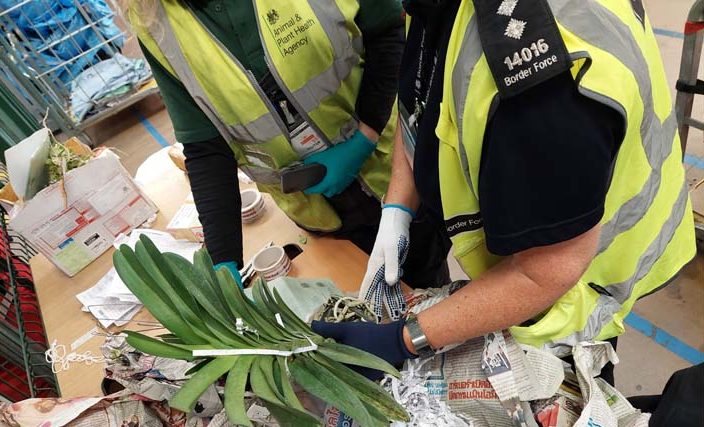HLS.Today – The illegal wildlife and timber trade are a pervasive global issue that has significant negative impacts on both the environment and local communities. These illicit activities, also known as wildlife trafficking and illegal logging, involve the illegal harvesting, possession, and trade of wild animals and plants, as well as the unlawful logging of protected forests.
Wildlife trafficking is a multibillion-dollar industry that involves the illegal trade of a wide range of species, including elephants, rhinos, tigers, pangolins, and rare birds. This trade is driven by a demand for exotic pets, traditional medicine, and luxury goods made from animal parts. It poses a serious threat to the survival of many species, and can also have detrimental effects on local ecosystems and economies.
Illegal logging, on the other hand, is the unauthorized cutting and harvesting of trees from protected forests. It is a major contributor to deforestation and habitat destruction, and can have serious consequences for the environment and local communities. In addition to damaging ecosystems and reducing biodiversity, illegal logging also undermines the rule of law and contributes to corruption and conflict.
Both wildlife trafficking and illegal logging are complex issues that require a coordinated response from governments, law enforcement agencies, and conservation organizations. In order to effectively combat these activities, it is important to address the underlying demand for illegal wildlife and timber products, as well as the economic and social drivers that contribute to these illegal trades.

One way to tackle the illegal wildlife trade is through targeted enforcement efforts that focus on disrupting the networks and supply chains involved in the trade. This can involve strengthening cross-border cooperation and intelligence sharing in airport security, as well as increasing penalties and sanctions for individuals and organizations involved in the trade.
In addition, governments and conservation organizations can also work to raise awareness and educate the public about the negative impacts of the illegal wildlife trade, in order to reduce demand for these products.
Illegal logging can be addressed through a combination of regulatory measures and law enforcement efforts. This can include strengthening forest governance and increasing oversight of logging operations, as well as implementing sanctions and penalties for individuals and companies involved in illegal logging. Additional efforts to promote sustainable and legal logging practices can help to reduce the incentives for illegal logging, while also supporting local communities and economies.
Overall, the illegal wildlife and timber trade are complex and pervasive issues that require a coordinated and comprehensive response. By addressing the demand for illegal products, strengthening law enforcement efforts, and promoting sustainable practices, it is possible to combat these activities and protect the world’s natural resources.
Thunder Operations enforce the Convention on International Trade in Endangered Species of Wild Fauna and Flora (CITES)
A joint INTERPOL – World Customs Organization (WCO) law enforcement operation has seen hundreds of arrests and the disruption of wildlife and timber crime networks globally.
Codenamed “Thunder 2022”, the month-long (3-30 October) operation brought together police, customs, financial intelligence units, wildlife and forestry enforcement agencies from 125 countries – the largest number of countries to take part in a Thunder operation since the series started in 2017.
Through routine inspections and targeted controls, hundreds of parcels, suitcases, vehicles, boats and cargo transporters were examined, often with the use of sniffer dogs and X-ray scanners.
Searches at land and air border checkpoints focused on illegally traded species protected by national legislation or CITES.
CITES is an international agreement to ensure that trade in wild animals and plants does not threaten their survival. All trade performed in breach of CITES is illegal.
Seizures ranged from timber to live animals, as well as animal parts, bushmeat, and derivatives such as clothing, beauty products, food items, traditional medicines and handicrafts.
Indian Customs at Chennai International Airport seize 1,204 reptiles (iguanas, pythons, monitor lizards and tortoises) declared as “ornamental fish’ and packed in cardboard boxes sent from Malaysia.
Thailand Suvarnabhumi International Airport: Customs detain a man traveling with five live radiated tortoises concealed in his clothes. Radiated tortoises are a critically endangered species.
Thailand’s Suvarnabhumi Airport: Customs seize 81 Indian star tortoises hidden in food packaging packed in the luggage of a passenger traveling from India.
A total of 750 birds were seized during Operation Thunder 2022, including here in Pakistan where authorities intercept the smuggling of young birds of prey.
Through routine inspections and targeted controls, dozens of timber transporters were examined throughout Mongolia as part of Thunder 2022 global operations.
A powerful global alliance
Although operational results are still being reported, Operation Thunder 2022 has so far seen almost 2,200 seizures and the identification of 934 suspects, triggering a series of worldwide arrests and investigations linked to illegal trading, processing, exporting and importing of protected wildlife and forestry products.
In addition to the identification of 141 companies suspected of engaging in illegal sales, total worldwide seizures of protected animals and plants so far include:
Wildlife:
119 big cats and other felines
34 primates, 136 primate body parts
25 rhino horns
9 pangolins, 389 kg pangolin scales and derivatives
750 birds, more than 450 bird parts
With seizures reported in units, or total kg, according to national police practices, results also include:
Almost 780 kg and 516 pieces elephant ivory, and 27 elephant body parts
1,795 reptiles and almost half a tone reptile parts and derivative products
4,337 and 2,813 kg marine products, including corals, eels and sea cucumbers
1,190 turtles and tortoises, 1,304 units and 8 kg body parts
More than a tone and 17,081 units other wildlife, parts and derivatives.
Plants and timber:
47,28 m3 rosewood and 17,163 pieces
Almost 47,000 m3 and 6,764 pieces other timber
710 cacti, 125 and 1,706 kg orchids
Almost 3.5 tones and 7,815 units other plants
More than five tones and 3,945 units plant derivatives.
In Southern Africa, Namibian authorities intercepted large amounts of timber before they were smuggled into the region, with Angola arresting a citizen of the Asian region attempting to travel to Asia with rhino horns and ivory ornaments, and Malawi authorities seizing elephant tusks at the home of a man with Asian citizenship.
In Asia, Thailand reported several seizures of tortoises from East Africa and hundreds of live reptiles from Europe, whilst Indonesia made two large seizures of timber bound for the Middle East and Asia. India seized some 1,200 reptiles (iguanas, pythons, monitor lizards and tortoises) declared as “ornamental fish’ and packed in cardboard boxes.
With Europe a growing destination region for protected wildlife, France intercepted reptiles from Central Africa hidden in luggage, Germany intercepted tiger skin amulets in a parcel from Asia and the UK seized several ivory pieces after investigating a man selling wildlife on an e-commerce platform.
Illustrating the commitment of the American continent to protecting its natural heritage, Costa Rica arrested an individual in possession of hundreds of protected wildlife species and Peru issued an INTERPOL Red Notice against a timber trafficker. Parrots, iguana eggs, coral, crocodile leather products, caviar and shark meat were seized in several US international airports.
Several countries reported seizures of garments and accessories made of reptile skins.
Mozambique authorities intercept elephant tusks being smuggled across national borders. A total of 780 kg and 516 pieces of elephant ivory were intercepted globally during Operation Thunder 2022.
Argentina police authorities rescue one of the 34 primates seized from traffickers globally during Operation Thunder 2022.
Operation Thunder 2022 saw some 2,200 seizures and the identification of 934 suspects, including this pet shop owner in Chile suspected of engaging in the illegal sale of protected species.
Young Rhea birds are intercepted by Peruvian authorities.
Through routine inspections and targeted controls, Peruvian authorities inspect hundreds of parcels, suitcases, vehicles, boats and cargo transporters throughout the country during Operation Thunder 2022.
Operation Thunder 2022 brought together police, customs, financial intelligence units, wildlife and forestry enforcement agencies from 125 countries.
A sample of protected species intercepted in the US during Operation Thunder 2022.
A CITES inspector in Belgium checks a flamingo ring identification as part of Operation Thunder 2022.
Almost 3.5 tones (7,815 units) of protected plant species were seized during Operation Thunder 2022, including here in Tbilisi, Georgia.
With Europe a growing destination region for protected wildlife and plants, UK agencies work together to intercept the illegal import and export of CITES-listed species.
Norway customs seize 13 undeclared protected parrots concealed amongst declared birds.
“Thunder operations are important to global security because timber and wildlife trafficking are not just conservation issues – officers lose their lives every year, livelihoods are destroyed, diseases are spread, governments weakened and entire economies destroyed. This is because the huge financial gains to be made attract serious organized crime and terrorist militants who grease the wheels of crime with heavy doses of corruption,” said INTERPOL Secretary General Jürgen Stock.
“Large scale cross-border operations like Operation Thunder 2022 are as much about putting criminals behind bars as about raising public awareness on what species or products people can or cannot buy, sell, or take from the wild. Global multi-stakeholder cooperation is key to effectively tackling transnational criminal networks, from seizure to arrest to prosecution, as with the data collected, customs administrations can refine their risk management and strategies,” said WCO Secretary General Kunio Mikuriya.
Intelligence-led field operations
Customs and police units shared wildlife and timber trafficking intelligence both ahead and during operations, enabling field officers to identify and target trafficking hotspots, with an emphasis on land and airport border points as well as wildlife parks.
Known criminals, particularly INTERPOL Red Notice fugitives, were identified ahead of operations, along with companies used to facilitate wildlife and timber crime.
Customs and police contribute to conservation efforts by gathering and delivering admissible evidence that supports investigations and prosecutions.
Coordinated jointly by the WCO and INTERPOL, with the backing of the CITES Secretariat and the International Consortium on Combating Wildlife Crime, Thunder Operations are funded by the European Commission’s Directorate General for International Partnerships, Norway’s International Climate and Forest Initiative, the UK’s Department for Environment, Food and Rural Affairs, and the US Agency for International Development.
The Environmental Crime Crisis - Threats to sustainable development from illegal exploitation and trade in wildlife and forest resources ENChainsaw Project - An INTERPOL perspective on law enforcement in illegal logging
HLS.Today Source: INTERPOL.INT








